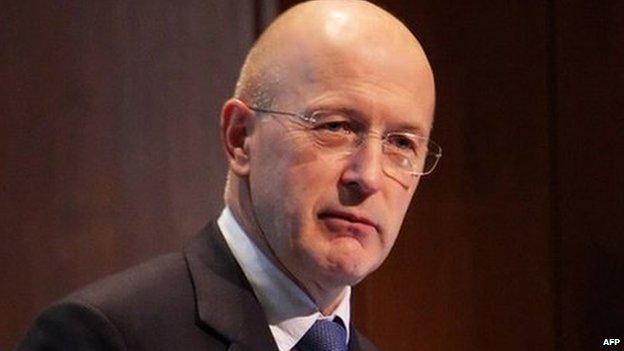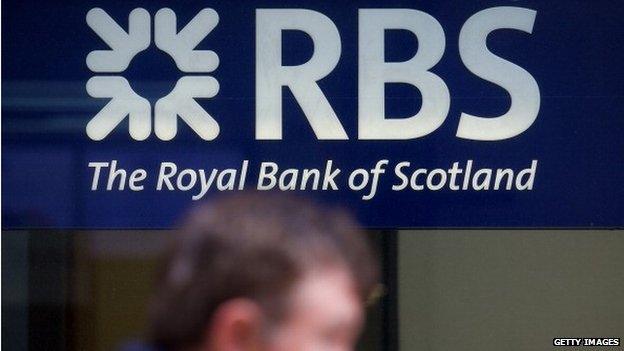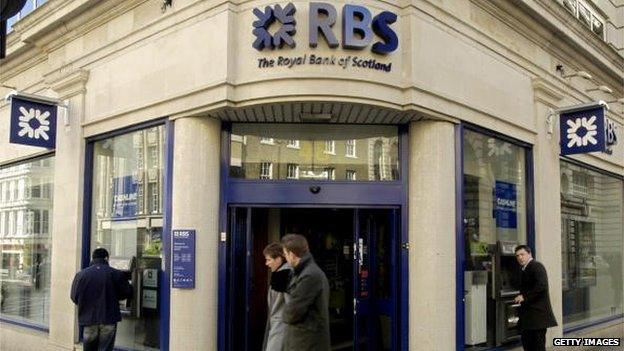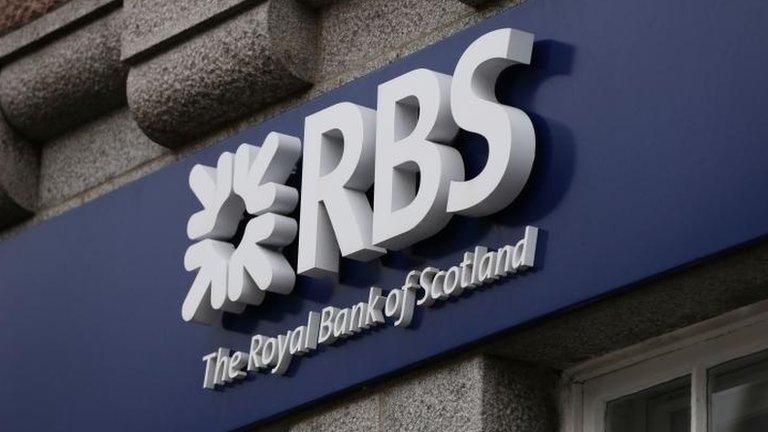RBS under fire at shareholders' annual meeting
- Published

Small investors have criticised the Royal Bank of Scotland (RBS) over "systematic" mistreatment of firms with distressed finances.
RBS chairman Sir Philip Hampton defended himself against the sharp and personal criticism at its annual general meeting.
Shareholders also quizzed him on the price the bank has paid for market rigging.
Mr Hampton said that a change of culture is "well under way".
They also questioned him about mis-selling financial products to customers.
He said the total cost of such misconduct, at nearly £10bn, has held back the bank's recovery from the financial crash.
Such behaviour has no place at RBS, but that changing culture takes time, he added.
"Culture is a journey, not an end point. You don't change culture by flicking a switch. You have to flick thousands and thousands of switches over a number of years.
"The process of cleaning up the industry is well under way. It's not done, but it's well under way."

RBS is preparing to be handed back to private sector - a process that may take several years
Mr Hampton is standing down as chairman at the end of August, to take up the chair at pharmaceutical giant GSK. Sir Howard Davies will replace him.
In his seventh statement to an RBS annual general meeting, he said that surplus capital released by the shrinking of the bank may be returned to shareholders.
This is after reaching a 13% tier one capital reserve - the amount required by regulators to protect against future shocks - and after re-payment to the government of a remaining £1.2bn fee for its support.
The Treasury took over 80% of the bank after it had to be rescued in 2008, with an injection of more than £45bn in capital. The Chancellor, George Osborne, said recently he wants to start selling that stake this year, and to do so in tranches.
A return to paying shareholder dividends is expected to help the process of selling that stake, but it was claimed the full return of the bank into private hands will take several years.
Chief executive Ross McEwan, said: "As we reduce risk, and make expected divestments over the coming years, we anticipate a substantial increase in our capital as a result.
"Subject to approval, we intend to return any surplus capital to our shareholders," he said.
One of the biggest divestments is the floating of RBS's Citizens Bank subsidiary in the US, which has already begun, and which should clear billions of pounds.
Branch closures
Facing other questions from shareholders, during a meeting lasting nearly two hours at the Gogarburn headquarters, directors said that branch closures are in response to the way customers are using services.
Mr Hampton said there has been a sharp drop in use of RBS branches, and a fast rise in mobile banking.
"Our busiest branch is now the commuter train from Reading to Paddington, where lots of people are doing their banking," the chairman said.

Physical branches of RBS are closing amid an increase in mobile banking
Quizzed on the computer banking problem last week, he said systems have got to improve. An inquiry is underway, led by Mr McEwan.
After being fined £56m for a computer meltdown in 2012, Mr McEwan claimed last week's problem was on a smaller scale, and that £750m has recently been spent on improving banking technology and its reliability.
Mr McEwan's report to shareholders set out plans to get the bank to where he wants it by 2019, with 85% of it by then in retail and commercial banking, rather than investment.
He also set out plans for women to play a more prominent role at the bank, with a target of occupying 30% of senior roles across all divisions.
Looking back on six and a half years as chairman, Sir Philip said he was sure he was leaving the lender in a stronger position:
"There have been highs and lows along the way, but overall RBS made great progress since 2009.
"It has been fundamentally rebuilt - it is now a bank that is much safer in capital strength, in structure and increasingly on behaviour."
- Published19 June 2015
